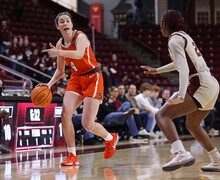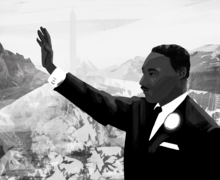You Op To Know: SU should add ASL to core curriculum
Laura Angle | Digital Design Editor
Welcome to You Op to Know, The Daily Orange Opinion section’s weekly podcast.
This week, The Daily Orange Opinion section brought on one of our liberal columnists Ryan Golden to discuss his column “SU should add ASL to its liberal arts core curriculum”
If you have any questions or comments, feel free to submit a letter to the editor at opinion@dailyorange.com.
Check back next week to listen to a dialogue about the most viewed column.
TRANSCRIPT
SUKESH: Hello everyone, I’m your guest host and co-producer Aishwarya Sukesh and welcome to The Daily Orange’s opinion podcast You Op To Know. Tonight we have liberal columnist Ryan Golden on the show to discuss his column “SU should add ASL to its liberal arts core curriculum”. Welcome Ryan.
GOLDEN: Hi.
SUKESH: So, why did you choose to write this column?
GOLDEN: Well because over the past few months I’ve been working in the student association concerning several issues that affected the student body. It wasn’t necessarily ASL, but last year during the presidential election it was one thing that was brought up and fought for by Ghufran and Kyle. It became of interest to me after they one and working with some of my friends who are advocating for those with disabilities on campus, it’s certainly become one I’m more interested in. I have gotten to understand better the university’s policies concerning ASL.
SUKESH: So what is the current system for ASL at Syracuse University? Why is it not already a recognized language?
GOLDEN: So the current system is you can take classes in ASL but they aren’t going to count for any foreign language requirement you may need. So you can still take a school led class on ASL, but if you are trying to do it to fulfill a language, currently that does not happen. The reason why it’s not recognized, there’s no official reason given by any body on campus as to why it hasn’t been added yet. But, as a member of the curriculum committee it has been brought up in meetings that several professors in the college of arts and sciences have concerns that enrollment in current language classes will drop. To me, meaning they are professors that are less interested in the wellbeing of the campus, and more concerned with their enrollment and the survival of their courses.
SUKESH: Is the interest in an ASL class from students who are hard of hearing/deaf or from able-bodied students? Who is this class for?
GOLDEN: Anyone. Anyone who is at all interested whether it’s for necessity or interest should take an ASL course. Having several family members of mine that are hard of hearing, it would be useful if I could learn ASL. It shouldn’t be an extracurricular activity, it should be something that could fulfill a requirement.
SUKESH: As you said in your column, the Student Association is pushing for ASL to be recognized as an official language at SU. What is the timeline of this, and how can students get involved if they feel strongly about ASL becoming a recognized language?
GOLDEN: So in terms of the timeline, right now we are in a research phase of it, trying to collect all the information that we can. We are pretty sure that nothing’s going to strike us that says this shouldn’t happen. Other universities do offer this. We are talking to professors who teach it, students who take the class, we are talking to the university. As Chair of Academic Affairs and a member of the curricular committee, I am looking at the back end politics of it. Trying to get it through the College of Arts and Sciences curriculum committee and then up to the university curriculum committee, that’s going to take some advocating and if any students are interested in helping the student association push for this and be successful in this, they can always join the academic affairs committee which meets sundays at 4 in the student association office in basement of schine. This is a hot topic that we are trying to push for for the rest of the academic year, and it is certainly is the number one issue for the academic affairs committee.
SUKESH: When do you think we can see this actually implemented.
GOLDEN: Hopefully, if everything goes as planned, we can see this brought to the curriculum committee next semester. So hopefully in the 2019-2020 academic year we can see this implemented, but it wouldn’t surprise me having worked with the university before on other issues, there is pushback and the timeline gets prolonged.
SUKESH: Was there anything you didn’t get to discuss in your column and wish you could go deeper on?
GOLDEN: I think the only thing I didn’t get to discuss is that it’s not pushback on logistics, it’s pushback from professors not wanting to lose enrollment in their classes. Which again, this shows they’re not interested in the overall well being of the campus, they are just interested in making sure students still come to their classes whether ot no they are actually interested in them. It’s important to remember that, that this university has done some good things but there are also issues concerning especially disabilities that this university is putting on the back burner that they really shouldn’t.
SUKESH: Do you think there is some sort of compromise with these professors that are giving pushback?
GOLDEN: I don’t know the compromise yet, that’s still back-end politics and we haven’t gotten to that stage yet, I do know that these were concerns raised last year. Ther ecound be compromises made but that would require different issues raised and things coming in. I do think that it would be in our best interest to try to work with these professors because to them they may be passionate about the language that they teach and that’s perfectly fine. But it’s important to recognise that other students have other interests with this case other necessities. We forget that ASL is used by so many people that are hard of hearing or deaf communicating but us communicating with them as well. Making sure that all members of society are treated with the same respect. People that are disabled concerning hearing, they should have the same ability to communicate with people and their language should be respected as anyone else’s.
SUKESH: Thank you so much for joining us this week Ryan.
GOLDEN: Any time.
SUKESH: Stay tuned for next week’s podcast where we will discuss more of our columns. If you have any questions or comments, feel free to submit a letter to the editor at opinion@dailyorange.com. We’ll talk to you next week.
Published on October 25, 2018 at 3:03 pm
Contact Allison: alweis@syr.edu






